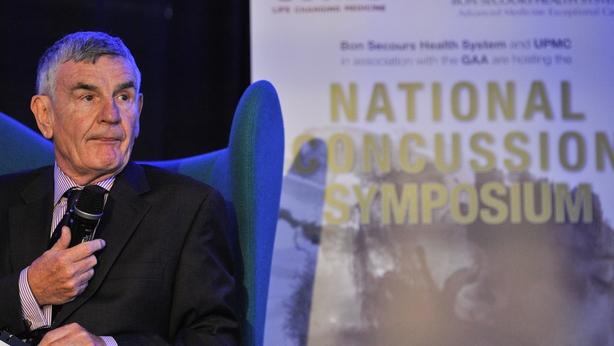Rugby is heading in the right direction when it comes to player-safety despite a number of high-profile incidents in the opening days of the World Cup, according to a prominent concussion expert.
Dr Barry O'Driscoll was previously World Rugby's medical chief from but resigned in 2012 in protest when a new pitch-side concussion test, which included a five-minute assessment, was introduced.
O'Driscoll, who won four Ireland caps in the 1970s, believed the measure was completely unsatisfactory and quit his position.
As recently as January 2017 he spoke out following incidents involving Conor Murray and Johnny Sexton returning to the field after head injuries during European games.
He told RTE: "[World Rugby have] lost total control of concussion, threatened concussion and what to do about it."
But he has been encouraged by what he has seen so far in Japan.
"It has taken us long enough, three or four years of head-on head knocks so I'm delighted with World Rugby's new law.
"[But] they are having a little bit of trouble with interpretation. I think the referees have all been explaining the incident quite well, like the head hit the neck or the face and going through the mitigation.
Ahead of the World Cup, referees boss Alain Rolland and Wayne Barnes were among those who spoke out about the new new high-tackle sanction framework.
"Nobody wants to issue a red. If an action merits it I like to think one will be shown," said Rolland, also a former Ireland international.
An explainer video that came out in May detailed the new aggravating / mitigating factors that officials would be taking into account when reviewing head-contact incidents.
However, there have been at least four incidents over three games that seemed to suggest that some people didn't read the memo.
Australia's Reece Hodge has been banned, following a hearing, for three games for a hands-free tackle that could have been used in the video as an example of how the new rule should have been applied. The officials took no action during the match against Fiji.
Two Samoan players, who were yellow-carded in the game against Russia in Ireland's Pool A, are also due to appear before a citing committee and face suspension.
In the first incident referee Romain Poite was set to show a red card to Lee-Lo during his side's bonus-point win at the Kumagaya Rugby Stadium after the Samoa and Cardiff Blues centre struck Vasily Artemyev in the head with his shoulder.
The French official, however, was talked down to issuing a yellow by English TMO Graham Hughes.
In the midst of all this World Rugby took the unusual step of criticising their own referees' performance with a promise that matters would improve.

"I'm delighted we've got this far," O'Driscoll, who is a second cousin of former Ireland captain Brian, told RTE Sport.
"The two Samoa yellow cards, which should have been red really, had mitigating circumstances of the tackled player lowering his body.
"In these cases it was more that the player, Vasily Artemyev, braced for contact rather than dipped, and I don't think we can allow that – it's not enough of a mitigating factor to reduce the card to yellow.
"We want the tackler to take a player bracing into account. It's different if a player suddenly ducks his head and dips to get under the tackle. It is a difficult job for the officials.
"I think they will get it sorted. A lot of the islanders tackle like this but they've got to learn.
"I believe the officials are going to meet again and try to work on consistency."
All eyes now turn to the officials' performance and there is no more room for error.
Listen to the RTÉ Rugby podcast on Apple Podcasts, Soundcloud, Spotify or wherever you get your podcasts.
Follow Ireland v Japan on Saturday (kick-off 8.15am) via the live blog on RTÉ.ie/Sport andthe NewsNowApp, watch live on RTÉ2 from 7.30am or listen to live match commentary on RTÉ Radio 1.


